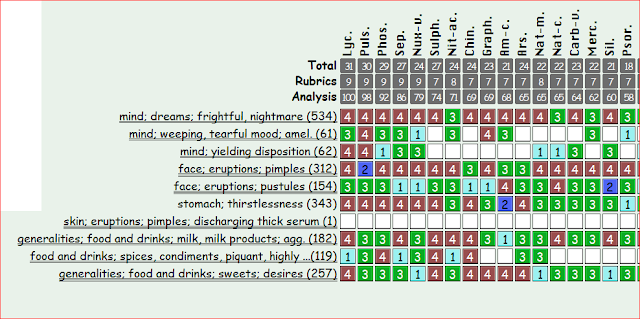After studying the writings of Hahnemann for over these years, I am more than
convinced that he was very clear as to the procedure for taking a case, and
what symptoms are required to be used for prescribing symptoms.
Nowhere does Hahnemann state that one symptom has priority or seniority
over another.
In aphorism 6, he instructs to take ONLY symptoms that have changed
since or just prior to the disease/infection, of the body and the mind. Here
there is NO differentiation of mental or physical changes in terms of rank.
In aphorism 153, he states: In this search for a homoeopathic specific remedy, that is to say, in this comparison of the collective symptoms of the natural disease with the list of symptoms of known medicines, in order to find among these an artificial morbific agent corresponding by similarity to the disease to be cured, the more striking, singular, uncommon and peculiar (characteristic) signs and symptoms of the case of disease are chiefly and most solely to be kept in view; for it is more particularly these that very similar ones in the list of symptoms of the selected medicine must correspond to, in order to constitute it the most suitable for effecting the cure.
The more general and undefined symptoms: loss of appetite, headache, debility, restless sleep, discomfort, and so forth, demand but little attention when of that vague and indefinite character, if they cannot be more accurately described, as symptoms of such a general nature are observed in almost every disease and from almost every drug.
Again NO differentiation between mental and physical symptoms.
If we be logical about this, Hahnemann is stressing to find altered expressions of disease in the now sick person, WHEREVER they are and WHATEVER they are.
In aphorism 133 he states: On experiencing any particular sensation from the medicine, it is useful, indeed necessary, in order to determine the exact character of the symptom, to assume various positions while it lasts, and to observe whether, by moving the part affected, by walking in the room or the open air, by standing, sitting or lying the symptom is increased, diminished or removed, and whether it returns on again assuming the position in which it was first observed, - whether it is altered by eating or drinking, or by any other condition, or by speaking, coughing, sneezing or any other action of the body, and at the same time to note at what time of the day or night it usually occurs in the most marked manner, whereby what is peculiar to and characteristic of each symptom will become apparent.
This applies to ANY symptom mental or physical.
Logic also dictates that if a sick person does not have an altered
mental change… WE CANNOT USE IT! We do not use personality in our prescription
ever, UNLESS ALTERED.
Many practitioners during the time of Kent and since have been taught that the mental disposition is the key to solving each case.
They Quote aphorism 211 to support this postulation. This holds good to such an extent, that the state of the disposition of the patient often chiefly determines the selection of the homoeopathic remedy, as being a decidedly characteristic symptom which can least of all remain concealed from the accurately observing physician.
However: a read of the aphorism in conjunction with the topic under discussion from 210 to 230, will show that 211 is the cornerstone of dealing with one sided mental diseases only!
If a practitioner spend his or her time searching for mental or emotional states for each and every the patient, they may miss out on the correct prescribing symptoms.
That is why we defer to original writings only and leave out interpretations so as to not make a mistake.
